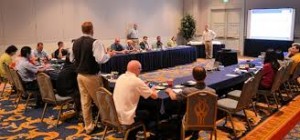Data Feedback Theatre of Inquiry
Data Feedback & Moving to the Invention Phase
Leaders at all levels have a profound effect on the culture of organisations. The dynamic processes of culture creation and management are the essence of leadership. Culture emanates from leaders’ beliefs about ‘success’ that are translated from core values – ‘what’s important’ and come to be represented by norms and behaviours.

Leaders transmit and embed culture through primary embedding mechanisms:
- What leaders pay attention to, measure and control
- Leader reactions to critical incidents and organisations crises.
- Deliberate role modelling, teaching and by leaders
- Criteria for allocation of reward and status
- Criteria for recruitment, selection, promotion, retirement and excommunication
And through secondary articulation and reinforcement mechanisms
- Organisational design and structure
- Organisational systems and procedures
- Design of physical space, facades and buildings
- Stories, legends, myths and parables about important events and people
- Formal statements of organisational philosophy creeds and charters.
The have overall accountability for organisation performance, but they know they are one step removed from the organisation’s direct value producing activities. Therefore they are the ones who create the conditions to enable others to be successful by:
- Setting the tone and ‘walking the talk’
- Leading the change movement, championing the reasons and benefits
- Putting support into the
- Positioning it as a top priority
- Giving clear messages
- Measuring it, holding employees accountable.
The data feedback phase aims to energize those involved so that they want to move to the next stage of the development agenda and commit to doing things differently.
Feedback is still part of the diagnostic process. More data will emerge as people work with the first cut of the data. Individual reactions to the data and the sense they make of it will give more the project more information to work with.
The OD Practitioner must summarise the findings in as simple a form as possible without sacrificing the validity of the data. The data can be fed back using a Theatre of Inquiry.
Sample Theatre of Inquiry Outline
|
Session |
Process |
|
Opening Remarks |
|
|
Presentation Data |
|
|
Break the audience into smaller groups to discuss these questions |
|
|
Bring the group back together |
|
|
Vote |
|
|
Open Space Forum (optional) |
|
|
Summary of actions (optional) |
|

